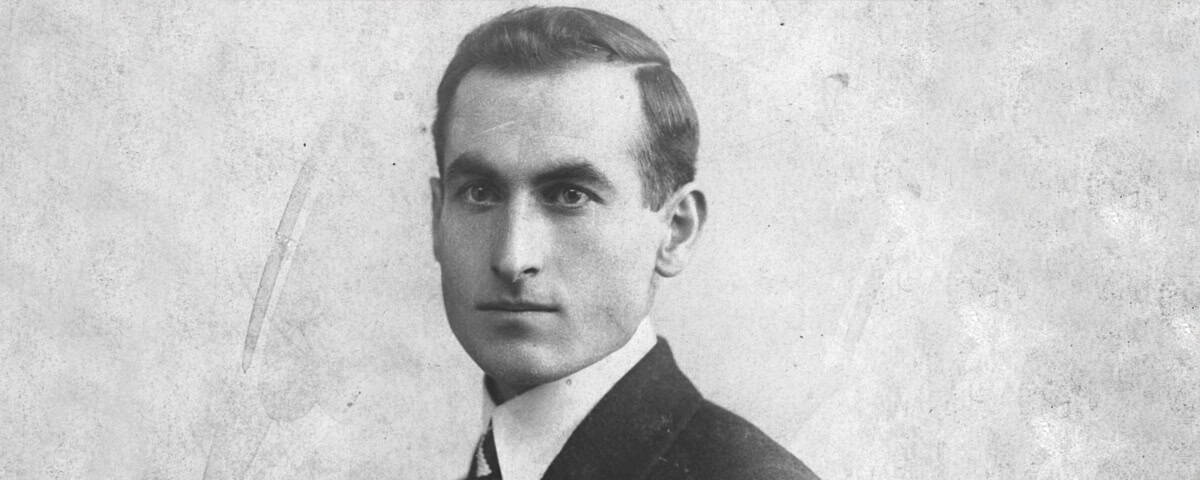Death of Soghomon Tehlirian (May 23, 1960)

“Tehlirian acted as the self-appointed legal officer for the conscience of mankind,” thought Polish law student Raphael Lemkin and started his quest to establish an universal jurisdiction to pursue the crime of what he would call “genocide.” Soghomon Tehlirian, who liquidated Talaat Pasha, one of the masterminds of the Armenian Genocide, is considered a national hero by Armenians.
Tehlirian was born on April 2, 1896, in the village of Nerkin Bagarij, in the region of Erzinga. He studied at the village school, then at the Protestant school of Erzinga (1905-1906) and at the Central School of Erzinga (1907-1912). His father had settled in Serbia to continue the family business in the coffee commerce. In 1913, he moved there to study engineering, but after the outbreak of World War I, in the fall of 1914, Tehlirian made his way to Russia and joined the Armenian battalions of volunteers on the Caucasus Front.
In June 1915, the Ottoman local police ordered the deportation of all the Armenians in Erzinga. Tehlirian’s mother, three sisters, his sister’s husband, his two brothers, and a two-year-old niece were deported. He lost a total of 85 family members to the Armenian Genocide.
After the war, Tehlirian went to Constantinople, where he liquidated Harutiun Mgrdichian, who had worked for the Ottoman secret police and helped compile the list of Armenian intellectuals arrested on April 24, 1915. Meanwhile, Operation Nemesis was being set up and Mgrdichian’s killing convinced Nemesis operatives to entrust Tehlirian with the assassination of Talaat Pasha. In mid-1920, the Nemesis organization paid for Tehlirian to travel to the United States, where Armen Garo informed him that the death sentences pronounced against the major perpetrators had not been carried out, and that the killers continued their anti-Armenian activities from exile. Tehlirian received the photographs of seven leading Ottoman leaders, whose whereabouts Nemesis was tracking, and left for Europe. He obtained a German visa in Geneva and arrived in Berlin as a mechanical engineering student in December 1920.
Tehlirian chased his target, Talaat Pasha, who had settled in Berlin after fleeing the Ottoman Empire. After a three-month surveillance, helped by a group of operatives, Tehlirian liquidated Talaat on the morning of March 15, 1921, in the district of Charlottenburg. The German police immediately arrested Tehlirian, who had been told by his handlers not to run from the crime scene.
Tehlirian was tried for murder, but was eventually acquitted by the jury. His trial was highly publicized at the time, taking place shortly after the establishment of the Weimar Republic, with Tehlirian being represented by three German defense attorneys. The trial examined not only Tehlirian’s actions but also Tehlirian’s conviction that Talaat was the main author of the Armenian deportation and mass killings. The defense attorneys made no attempt to deny the fact that Tehlirian had killed a man, and instead focused on the influence of the Armenian Genocide on Tehlirian’s mental state. It took the jury slightly over an hour to render a verdict of “not guilty.”
After the trial, Tehlirian first moved to Cleveland in the U.S. and then to Marseilles and then Yugoslavia, settling in Serbia. He changed his name to Saro Melikian, which he used until the end of his life. (The New York Times ran his obituary under that name.) He eventually married Anahid Tatikian, who was also from Erzincan. The Tehlirian family lived in Belgrade until 1950, when they moved to Casablanca, Morocco (1950-1955) and Paris (1955-1957), and finally to San Francisco.
Tehlirian died on May 23, 1960, of a cerebral hemorrhage, and was buried at the Ararat Cemetery in Fresno, California, where a monument was erected over his tomb. Busts and monuments have been inaugurated in Armenia since 1990. The film Assignment Berlin (1982), directed by Hrayr Toukhanian, chronicled Talaat Pasha’s assassination in Berlin.
